 newsitems
newsitems  EU+COE Experts to EF: PanEuropean Developments on Citizens Participation to Public Decision Making ?
EU+COE Experts to EF: PanEuropean Developments on Citizens Participation to Public Decision Making ?
EU+COE Experts to EF: PanEuropean Developments on Citizens Participation to Public Decision Making ?
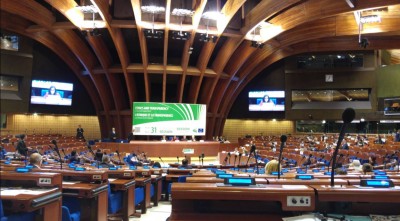
*Strasbourg/CoE/Angelo Marcopolo/- One among the most Important Issues, both in People's everyday Life, and in the Scientific Theory of Public Power and Democracy in Contemporary Societies, that a World-Famous Classical Book of Liberal Philosopher Spencer had tried to resume in a few words by the excessively concise Heading : - "Man versus the State", surprisingly emerged among several Topical affairs' Debates in CoE's Parliamentary Assembly, followed by its Local/Regional Democracy Watchdog : the PanEuropean Congres of Local and Regional Authorities (CLRAE), these last two weeks in Strasbourg, as it results particularly from a series of Converging, interesting Interactions that "Eurofora" had with some Key EU and/or CoE Experts about certain recent Legal Developments :
The New President of CLRAE, Austrian representative Mrs Gudrun Mosler Tornstrom, from Austria, (Comp. other GMT's Replies to "Eurofora"'s Questions, f.ex. at : http://www.eurofora.net/newsflashes/news/newclraepresidentfordigitaleducationagainstradiicalisation.html), while Highlighting the main Priorities of that PanEuropean body during the Next 4 Years of the forthcoming 2017-2020 Period, (First during a Press Briefing with Strasbourg Journalists, including "Eurofora", and Later-on also at CLRAE's Plenary), stressed, inter alia, that they included fresh efforts focusing on a "100% Application of all the 1985 "Charter of Local Self-Government", i.e. including its 2009 "Additional Protocol", which Explicitly Recognizes a Citizens' "Right to Participate in the Affairs of a [Local] Authority".
According to its Article 2, this includes, f.ex., "Procedures for Involving People", (such as : Consultations, Referenda, Petitions, etc), "Access to Official Documents held by [Local] Authorities", and "Mechanisms...for Dealing with, and Responsing to Complaints and Suggestions regarding the Functioning of of [Local] Authorities and [local] Public Services".
- "For the Promotion and Exercise of th[is] Right to Participate", CoE's Charter "encourage{d] the use of Information and Communication Technologies", and this was "Applie[d] to All categories of [local] Authorities", its Article 3 added.
Already, the initial, 1985 "Charter", had made it Clear that the support to the Representative Democracy also at a local level, "exercised by Councils or Assemblies composed of Members freely Elected" by the People, "shall in No way Affect recourse to Assemblies of Citizens, Referendums, or Any other Form of Direct Citizen Participation, where it is permitted", (Art. 3, §1), but rather go together with it, almost in parallel.
By an astonishing coincidence, all this Fits quite well, an "Eurofora" co-Founder's extensive Legal Analysis of relevant Developments concerning in particular the mainly French and Greek, but also Italian, German, UK, etc. Public Administrative Law, already as early as since a 1979-1980 substantial Research Work of more than 1.000 pages, which had been selected by Strasbourg's Faculty of Law for a Prize normaly awarded to PhD. Thesis, after an official proposal by Professor Paul Amselek, (later-on Professor in Philosophy of Law at Paris II University), as well as in a subsequent, extensive Research made in view of a State Doctoral Thesis ("Thèse de Doctorat d'Etat"), particularly as far as it regards the developments consecrated to "the Monitoring of the Decision-Making Process" of those Entities, (i.e. Moral Persons of Public or Private Law, from the State to Public Enterprises and/or certain Private entities exceptionaly Habilitated to take some Decision which must be based on General Interest).
The move went in a Similar Direction, mutatis-mutandis, as that of the (quite Different in nature, but, in fact, very Close in main Substance and in their Inspiration) various Projects that we presented, later-on :
- First in a 1997 Collective bid, signed by main Strasbourg's Journalists specialized in EU/CoE+ News, Universitarians focused on International Relations, etc., nick-named "Europe in the Word" (EIW), that EU Commission officialy accepted to examine in the framework of "ESPRIT" Program for Innovative Social Utilisations of Modern Information and Communication Technologies.
+ As well as in a Public Presentation that we made, later-on, at an EU Parliament's Press Conference on 2006 in Strasbourg, with the EU Commissioner in charge of Communication policy and EU Parliament's vice-President in charge of Press and Communication relations, (registered in Official EU Videos).
++ In addition to the "Eurofora" Project itself, Published shortly afterwards, since 2007, (i.e. at the 10th Anniversary of the Initial "EIW" Project : Comp. Supra), mainly for EU Citizens' public Debates with MEPs and/or other EU Law-makers, Before Final Decisions are taken by EU Institutions (such as the European Parliament, Commission, etc) which affect People's lives and/or Society at large.
Meanwhile, the PanEuropean Organisation for Human Rights, Democracy and Rule of Law of the Strasbourg-based CoE, which Extends Now to 47 Member States, had prepared and Published, from the Late 1990ies, an interesting, Basic "Handbook on Administrative Law" main principles, particularly for use in Central-Eastern European Countries, shortly After the European ReUnification had been Completed, as far as the CoE in itself was concerned, i.e. since even Russia had joined that PanEuropean Organisatio of Strasbourg, as Early as already since 1996, which contained at least some Key Parts of the above-mentioned Principles.
After various, more Recent interactions with Strasbourg's Faculty of Law, a landmark 2-Day-long Conference was, later-on, organized here about Relevant Issues, with many Key-note Speakers from Paris Universities, EU Council's Legal affairs Director, Universitarians from Strasbourg, Rennes, etc, Senior Officials from the French State, and even Digital and Communication Technologies Experts, etc., on 2010, focusing mainly on various EU, CoE, ECHR and other National, European and PanEuropean Legal and practical developments about Citizens' Dialogue with Public Administrations due to take Decisions affecting their Rights, (in the Discussions of which, we participated actively).
Meanwhile, the Entry into Force of EU's "Lisbon Treaty" on 2010, brought to the Limelight the "Charter of Fundamental Rights" of the European Union, (that an EU Heads of State/Government Summit in Berlin, back on 2007, had already supported Politicaly : Comp. "Eurofora" Co-Founders' NewsReport from that event, published then at "TCWeekly"+), which Recognizes an EU Citizen's "Right to Good Administration", consecrating "the Right to have his or her affairs handled Impartially, Fairly and within a reasonable Time by the institutions, bodies, offices and agencies of the Union", which includes a "right ...to be Heard, Before any individual Measure which would Affect him or her adversely is taken", "to have Access to his or her File", and "the Obligation of the Administration to give Reasons for its Decisions", (Art. 41 §1 and 2).
On this occasion, the twice-Elected "EU Ombudsman", Professor Nikiforos Diamandouros, who was then in charge, speaking to "Eurofora" right from the Start of that landmark Year 2010, had already Stressed his Intention to Focus on Developing EU's New Legal Principle about EU Citizens' Right to a "Good Administration", much further, believing that it had Opened New Possibilities for EU Citizens' rights, (See, f.ex. : http://www.eurofora.net/newsflashes/news/euombudsman.html ).
But EU's "Court of Justice", Headquartered at nearby Luxembourg, had already evoked a Protection against Arbitrariness, as Early as since some 1989 Judgements, followed by more, later-on, f.ex. on 2014, when also the Strasbourg-based, PanEuropean CoE's ECHR issued also a Series of similar Judgements, (Comp. Infra, about CoE's "Venice Commission"'s latest Analysis, just published earlier this year).
Followed an interesting "World Forum for Democracy", organized by the PanEuropean CoE in Strasbourg during a Week at the End of November 2013, which focused, for the 1st Time, on "Connecting Institutions and Citizens in the Digital Age", with a plethora of Political Ideas and mainly various Technical Tools recently developed for that purpose, (Comp., f.ex., among others, also : http://www.eurofora.net/newsflashes/news/eupiratepartyseipenbuschworlddemocracyforum.html ).
Relevant developments were, subsequently, examined also by EU Parliament's Secretary General, Klaus Welle, who briefly but topicaly discussed such issues with "Eurofora" after an exceptional Public Speech in Strasbourg, Less than 1 Year later, on February 2014, i.e. practicaly at the Eve of the latest Electoral Campaign for May 2014 European Elections, (See, f.ex., also : http://www.eurofora.net/newsflashes/news/euparliamentsecretarygeneralonmayelection.html ).
And Now, on October 2016, the PanEuropean CLRAE's Autumn Plenary Session has just debated and Voted this Friday Noon, on a Report drafted by Dutch ChristianDemocrat/EPP representative, Jos Wienen, about CoE's prestigious PanEuropean/International "Democracy through Law and Human Rights" Monitoring body, composed by Top Legal Experts, (mainly Presidents of Constitutional Courts in Member States, highly specialized University Professors, etc), known as "Venice Commission" (after the Historic Italian City where it usualy holds most of its Plenary Sessions), focusing on a "Rule of Law Checklist" destinated to "Evaluate the state of the Rule of Law" in each Country, that it has Adopted officialy since March 2016, which includes (for the 1st Time in such a Crystal-clear, and Explicit way) certain Important Provisions Relevant to the above-mentioned Issues :
- F.ex., among a Series of Legal "Benchmarks" for the "Prevention of Abuse [MisUse] of Power", CoE's "Venice Commission" examines mainly if there are "Legal Safeguards against Arbitrariness and Abuse of Power ("detournement de pouvoir" in French) by Public Authorities, and, particularly, "clear legal Restrictions to Discretionary Power", "Mechanisms to Prevent, Correct and Sanction Abuse of Discretionary Powers" submited to "a Judicial Review", an Obligation for Public Authorities ... to Provide Adequate Reasons for their Decisions, in particular when they Affect the Rights of Individuals", (etc).
Because "an Exercice of Power that Leads to substantively UnFair, UnReasonable, IrRational or Oppressive Decisions", would "Violate the Rule of Law", according to CoE's PanEuropean "Venice Commission"'s benchmarks. As well as any "Unfettered Power", deprived of Legal Indications for "the Scope of any such Discretion", in order "to Protect against Arbitrariness". Moreover, a "Judicial or other Independent Review" "should Control" any eventual "Abuse of Discretionary Power", while all "Administrative Decisions" must have an "Obligation to Give Reasons", according to "Venice Commission"'s "Rule of Law Checklist", (II, C, 64-68).
This goes also for "Private Actors in charge of Public Tasks", since "the Law" must "Guarantee that Non-State Entities, which, fully or in part, have taken on traditionally Public Tasks, and whose actions and decisions have a Similar Impact on ordinary People as those of Public Authorities, are Subject to the Requirements of the Rule of Law, and Accountable in a manner Comparable to those of Public Authorities".
Particularly in "a number of Areas where Hybrid (State-private) Actors, or private entities, exercice Powers that, Traditionally, have been the domain of State Authorities, ("including", f.ex., "in the Fields of Prison Management and Health Care", etc). Because "the Rule of Law must Apply to such situations as well", (Ibid, II Benchmarks, A Legality, 8). Or, otherwise, <<also in Moral Persons of Private Law, ... exceptionaly Habilitated to take some Decision which must be based on Criteria of General Interest>, (as we had already noted at our 1979-1980 initial Research Paper : Comp. Supra).
=> So that, Nowadays, it has become more and more Crystal-clear, that all EU's 28 Member States, and, in fact, even all PanEuropean CoE's 47 Member States, have, in substance, to Respect at least a Minimum of Rules concerning Citizens' Rights in the Decision-Making process even of Discretionary Power competences of any Public Authorities, and/or for Public Tasks, (as explicited Supra).
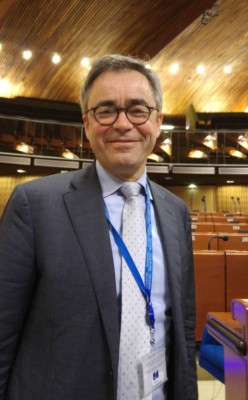
>>> - "All This is, in my opinion, much More Important for the Development of Democracy nowadays, than many other steps, including even popular Referenda, etc.", Replied to a relevant "Eurofora" Question, CLRAE's Rapporteur on those 47 Member States stong "Venice Commition" Rule of Law Benchmarks, Dutch representative Jos Wienen, (who was competent to deal both with Small or Big Municipalities, including "MetroPolitan" entities, as well as Regions and/or Federated "Länder", as f.ex. those existing at nearby Germany, etc. : Comp. Supra).
+ In Addition, such Converging Developments, mutatis-mutandis WideSpread, in substance, throughout some 50 Countries or so, during More than +35 Years now, (1979/1980-2016 : Comp. Supra), clearly Confirm also anOther Basic Hypothesis in "Eurofora" Co-Founder's above-mentioned University Research :
Indeed, if Law can be, Both a Technology, and a Real, fully-fledged Science, (mainly in the sense of a Specific Dimension in the History of Human Society, f.ex. as a Classic Franco-German "Historic" School of thought about Legal phenomena traditionaly claimed), then, at least the Elementary Rules found to exist in some Countries during a Stage or Era of Development of a certain kind of Society, should, normaly, be Similar to the Rules existing also in almost All Other Countries during that Same Social Stage, as "Eurofora" had, by a Timely Coincidence, just Discussed, last week in Strasbourg, during CoE Assembly's (PACE) Plenary Session for Autumn 2016, with the President of the Brussels-Headquartered "European Association of Administrative Judges", Dr. Edith Zeller, an Experienced Top Judge herself at Wien, Austria.
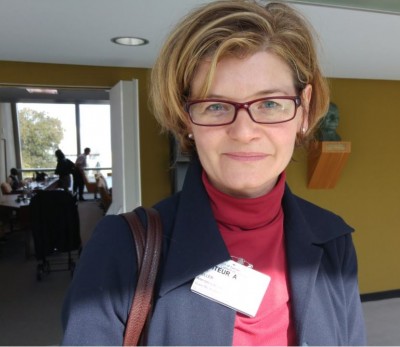
President Zeller, who had been Invited, Together with 2 Other Top European Jurists Associations' Heads, to be a Key-note Speaker at an Important and Topical, Human-Rights related collective Side-Event organized by Experienced, former PACE President, Top Liberal MEP and former Minister, Anne Brasseur from Luxembourg, (See : http://www.eurofora.net/newsflashes/news/europeanjudgesgroupsslamoppressioninturkey.html ), was Strategicaly well-placed, with the Scope of her main Area of Activities covering that of "Administrative Judges" throughout all Europe, i.e., precisely, those who are entrusted with the Task to Monitor Public Authorities' Decisions mainly from the point of view of their Conformity, or not, with the Rules of a State of Law, ("Controle de Légalité des actes administratifs"), in order to Evaluate such an "Eurofora"s Hypothesis, as far as, at least an Elementary Set of Legal Rules on Citizens' Rights in the Decision-Making process of Public Authorities, (from National States down to Local/Regional Authorities, as well as EU and/or Other European Institutions, etc), are concerned.
- However, Initialy, her Spontaneous Reaction was to Start speaking about the, apparently, "numerous Differencies" which seem, at First Sight, to always exist Between various European Countries, in the Field of "Administrative Law", i.e. in the Legal Status of Courts Monitoring Public Authorities' activities vis a vis Citizens' Rights, as she characteristicaly told us at the Beginning.
But, shortly After Exchanging Views with "Eurofora" mainly on the Fundamental Issue of Law as a Science (Comp. Supra), and Following also our Observation of the Astonishing, at First Sight, Fact that, f.ex., even the Top Judge, placed at the Head of the Highest Administrative Court, ("Conseil d'Etat" : i.e. that which Monitors the Administrative branch of Courts, which Judge Cases mainly Between Citizens and Puiblic Authorities, and Not of the Different, Judiciary branch of Courts, which judge mainly Cases Between Private Persons), of an EU Member Country which notoriously Followed mainly a Franco-German (and a little-bit Italian, etc), i.e. Continental System of Law (Dogmaticaly Divided , such as also in Greece, Italy, etc., had, Surprisingly, been Educated in ...British Universities, studying the Anglo-saxon "Common Law" system, Dr. Edith Zeller finally Agreed with us, at least on the Substance of the matter.
- Indeed, the Experienced President of the European Association of Administrative Judges endorsed, in fine, "Eurofora"s main Hypothesis that, if Legal phenomena correspond to real objects of a Science, then, Both in General, and in the particular case of Rules on Citizens' relations vis a vis Public Authorities, some kind of Elementary Similar Legal Principles, applicable in All Countries where a similar "Structure" of Society must exist, at least "Deep Inside", and Despite any Superficial, f.ex. Verbal or other, Misleading Appearance of so-called "Differencies" or even seemingly "radical Incompatibilities" between Various States' Legal Norms, as they Used to be Systematized in the Past, according mainly to Traditionaly Diverging National points of view.
+ Moreover, she Added that "a Wide Recent trend towards a kind of <<Europeanisation>> of Law, (through the EU and the CoE, as well as via a Massive Augmentation of Trans-Border exchanges and enhanced Cooperation), has Both Helped to Unveil and Better Discover, as well as to Further Accentuate, in real "Hard" Facts, such Legal Convergences between various European Countries", as Dr. Zeller stressed to "Eurofora" later-on, particularly in matters as those mentioned above.The Latest legal Developments about the EU's and mainly CoE's relevant Activities in Recent Years, obviously seem to Corroborate quite well this President Edith Zeller's Conclusion on "Eurofora"s main observations, (Comp. Supra).
-------------------------------------
But, where might it Stop, and until where Can it Go, in the foreseable Future, such a more and more Widely Spreading Movement on key Citizens - State relations ?
CoE's "Venice Commission", has notoriously Developed recently even some International, if not Global Ambitions, Extending its Membership and/or its Expertise, after the 47 PanEuropean CoE's Member States, even to several Third Countries, from Various Other Continents in the World, particularly in Africa (Morocco, etc), and Asia (Kazakhstan, etc), but even towards Latin-American Mexico, Bolivia, Peru, Chile, or the Costa-Rica HeadQuarters of the Inter-American Court of Human Rights, etc.
But, while the Latin America Sub-Committee of CoE's "Venice Commission" is currently preparing to meet, Next Week at Lima, on the occasion of a 2 Days - Conference on "Constitutional Reform and Democratic Stability", co-organized together with Peru's Constitutional Court there, on October 24-25, surprisingly, it was, Today (Friday, October 21), in Strasbourg, ...China's representatives who intervened at the Conclusion of CLRAE's Plenary Debates, here, on CoE's Constitutional Law Watchdog's "Rule of Law Checklist", (Comp. Supra) :
- In particular, Qing Boming, Secretary General of the National Council, in Chinese People's Association for Friendship with Foreign Countries, and China's International Friendship Cities Association, HQ at Beijing, expressed, on this occasion, their Interest in the PanEuropean CoE's Local and Regional Democracy Watchdog's activities, and vowed to be "Inspired" by the main Principles which Guide them in the foreseable Future.
That representative from China, which is an "Observer" at the CLRAE "since 2010", as he reminded later-on, Speaking to "Eurofora", showed a keen Interest also in the Description and mainly the Political background of the much Wider "Observer" Status of some Other Non-European Countries throughout almost All activities of the Strasbourg Organisation, (including inside its Highest Political body of the Committee of Ministers, its Parliamentary Assembly (PACE), etc., which has been, notoriously, created from as Early as, already since 1996, i.e. precisely 20 Years Now (1996-2016), when Russia made its Historic Entry as a Full Member of the 47 Countries Strong PanEuropean Organisation, triggering also USA's own wish to participate with a Special Status of Permanent "Observer" at the CoE, to be Joined shortly there also by Canada, Mexico, Japan, etc.
Even if he practicaly concluded by Focusing rather on his Readiness to eventualy Help create Closer Links between China's Cities and/or Regions with Regions of France, currently Chaired by Philippe Richert, President of Strasbourg's New "Great East", considerably Enlarged Region, which Now (since 12/2015) is one among the Few, or maybe even the Only one in Europe, to Link Together 5 core EU Countries via Trans-Border Links, as the Experienced head of the German-Speaking Region of Belgium, CLRAE Committee President Karl-Heinz Lambertz, Author of a landmark Book on Trans-Border Relations throughout All the European Continent, confirmed to "Eurofora" earlier this week, (i.e. France, 2 German Länders, Switzerland, Luxembourg and Belgium : Comp. some among the various recent Statements of President Richert to "Eurofora", including at the Recent RoF Congress at Reims, 9/2016, f.ex., at : http://www.eurofora.net/newsflashes/news/frenchregionspresidentricherttoeurofora.html +...),
So that, Today, China, (which has established, nevertheless, a General Consul's office here), is the Only One among the 5 United Nations' Security Council 5 Permanent Members, at New York, which is Not Yet officialy Represented as a regular and fully-fledged "Observer" in Strasbourg, throughout all the wide spectrum of CoE's various activities and projects, Contrary to all Other 4 NY SC PM, (USA, Russia, France, UK), and while even Canada, Mexico and Japan, as well as Vatican's Holly See, etc., hold currently such a Special, CoE Observer Status here.
However, from the 1st Day of his Election by the Chinese CP Congress in Beijing, the current President of China, Xi Jinping, had surprisingly Chosen to Focus, in his 1st Public Address to Journalists, (Directly Followed then by "Eurofora" in Real Time, "Live", through special Internet Connections, despite the usual Big Difference in Timeframe : f.ex. it was made practicaly OverNight, through Early Morning, here in Europe), mainly on certain Key Points suprisingly Evoking, in great part, a possible Evolution towards at least some among the most Important aspects of what Western Countries use to name as "Rule of Law", (or "Etat de Droit in the original in French, "Rechtstaat" in Deutsch, etc) in so-called Modern Democratic Societies, (See a relevant "Eurofora"s NewsReport, published Immediately after that Exceptional event, at : http://www.eurofora.net/newsflashes/news/chinajinpingandcoe.html ). And, until now, the subsequent Developments during President Xi's mandate, seem to accredit, for a large and significant part, that initial overall impression. (F.ex., particularly in certain Key domains, such as the Fight against Corruption, Citizens' Rights against eventual Arbitrariness by Bureaucracy, Government's readiness to Inform and/or Consult Citizens on at least some Important Decisions due to affect their Lives, some more possibilities for them to eventualy alert and/or hold a kind of Dialogue with the competent Public Authorities, etc, in the Speficic National and Political conditions and characteristics which Mark the Culture and History of Each Country).
It's also true that, also in the somewhat Different case of all Former "Eastern European" Countries, starting by Hungary and concluding by Russia itself, which completed their full Accession into the CoE, (with the Only Exception of Bielorussia, up to former USSR Member Kazakstan, etc), initialy, their Long and often Zig-Zaguing Route towards Becoming a Full CoE Member Country, had, at First, Started Evolving on its own, Original and Upredictable, then, Pathway, through CoE's ..."Cultural" Convention, which didn't anounce, neither pre-judge at all about their eventual Future Integration inside Strasbourg's Organisation...
So that, mutatis-mutandis, something, at least Partly, Similar might Not be Excluded, in Theory, also in the current case of China, in a more or less unpredictable Future, naturaly adequately adapted at the original, Historic, Political and Cultural Identity of such a Big Country with one among the Few Ancient Civilisations in the World. (Almost as also the Greek, and, perhaps partly the Jewish Civilisations have also tried to do, despite, however, of some brutal "Intervals", during several Centuries of Foreign Military Invasions and Occupations, in these 2 Different cases - thanks, particularly, also to the so-called "Secret Schools" in the case of Greek People, who inherited and kept alive Ancient Greece's and Byzantine Empire's over-Millenary legacies, even during 400 Years of Foreign Ottoman-Turk Oppression - while, on the Contrary, the also Important Ancient Civilisations of Egypt, Rome, Arab world and Persia, as well as of the Incas and Mayas, etc., had been notoriously Interrupted, without any real Continuity, nor Direct Link to the realities of Today).
But, in that case, given also the quite Original Socio-Political Path chosen by the Chinese People, through their own Long History until Modern Times, then, wouldn't it be rather Difficult, if not Impossible to Explain that supposed Link between "Legal supra-Structures" and Socio-Economic infra-structures of each Society, that we evoked previously, in the context of an attempt to shape a Scientific Theory of Law (Comp. Supra) ?
The already Existing, even if somehow Different and partly Contradictory, Example of Russia, (a fully-fledged CoE Member already since 1996, while also apparently keeping a lagely Original Socio-Economic InfraStructure, at least in Great Part), might, perhaps, indicate that an Adequate Analysis, added to some more real Adjustments on grassroots level, etc., could, eventualy, Contribute into Finding a Way to Imagine a certain Coherence in this sense, Despite the quite Original Version of Each Case, which are Not totaly Identical.
After all, even the Contemporary "Western" Societies, f.ex. in Europe and/or the USA and Canada, Australia and New Zealand, etc., with their Widely "Technocratic" recent Developments, do they really keep still a 100% Totaly Identical Continuity with the Initialy "Bourgeois" or purely "Capitalist" Socio-Economic infra-Structures of an already quite remote Past ?
Sometimes, (as the New EU Commission President, Jean-Claude Juncker, an Experienced Long-Time former Prime Minister of Luxembourg, and f. Chairman of €uroGroup, used to find, when, as a Young Student at Strasbourg's Faculty of Law, almost at a Similar Time as that of "Eurofora"s co-Founder, he was More Curious to attend CoE Assembly's European Debates, than assisting at his Class' Seminars, according to what he acknowledged with Humour when he recently, at last, got a Doctorate Degree by the University of Strasbourg "Honoris causa", at a quite "evolved" Age), certain PanEuropean CoE's exchanges, really risk to lead much Further Away than initialy expected...
***
("DraftNews", as initialy Send to "Eurofora" Subscribers/Donors, earlier. A more accurate, full Final Version, might be Published asap).
***
Main Menu
Αρχική Press Deontology/Ethics 2009 Innovation Year EU endorses EuroFora's idea Multi-Lingual FORUM Subscribers/Donors Συχνές ερωτήσεις Η άδεια του Elxis Σύνθετη αναζήτηση EuroFora supports Seabird newsitems In Brief European Headquarters' MAPs CoE Journalists Protection PlatformBRIEF NEWS
- 00:00 - 02.06.2021
- 00:00 - 18.10.2020
- 00:00 - 19.06.2020
- 00:00 - 18.05.2020
- 00:00 - 20.04.2020
- 00:00 - 02.02.2020
- 00:00 - 09.12.2019
- 00:00 - 27.11.2019
- 00:00 - 16.11.2019
Popular
- Yes, we could have prevented Ferguson riots says World Democracy Forum's Young American NGO to ERFRA
- Spanish People Elect CenterRIGHT Majority with 1st Party and Total of 178 MPs (6 More than the Left)
- Pflimlin's vision
- The European Athletic "Dream Team", after Barcelona 2010 Sport Championship Results
- Source Conseil d'Europe à ERFRA: Debatre Liberté d'Opposants à Loi livrant Mariage+Enfants à Homos ?
- Head of BioEthics InterGroup, MEP Peter Liese : "Embryonic stem cell research reaching its END" !?
- Spain: Jailed Turkish Terror suspect with Explosive,Drones,Chechen accomplices stirs Merah+ Burgas ?
- UN Head Ban Ki Moon at CoE World Democracy Forum : - "Listen to the People !"
Latest News
- EUOmbudsmen Conference 2022: Digital Gaps affect People's Trust threaten EF Project on EU Future ?
- French Election : Black Out on Virus, but Obligation for Fake 'Vaccines" Challenged
- Both French Presidential Candidates point at "Humanism" in crucial times...
- France : Zemmour = Outsider may become Game Changer in Presidential + Parliamentary Elections 2022
- PACE President Cox skips Turkey Worst (Occupation) case compared to Russia (DeMilitarisation) query
Statistics
Επισκέπτες: 56754059Archive
Login Form
Other Menu
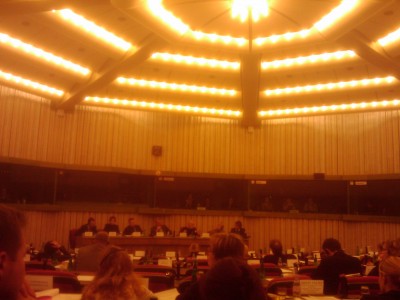
Facing a 70% Abstention threat in 2009 Election, EU endorses EuroFora's idea for Citizens' debates on crucial EU decisions !
- Different views on "Europe's Future", should be debated among Citizens at June 2009 EU Elections, thanks to political Parties' "Manifestos", says EU Parliament's Report
A main idea, initiated and promoted by EuroFora's founders since 1997: the vital need to develop European Citizens' democratic right to actively participate in multilingual debates on EU decisions, is formally endorsed by the EU from 2009 !
The move is a key attempt to overcome "catastrophic" Polls which warn that only ...30% of Citizens are ready to vote in the forthcoming June 2009 EU Election ! This was revealed by EU Commission's vice-president, in charge of Communication policy, Margot Wallstrom, during a "hot" meeting of EU Parliament's Committee on Culture and Education, during the December 2008 Strasbourg session.
Wallstrom faced criticism, but also suggestions from various MEPs, naturally worried by Abstention threats which herself found even "worse" than in 1999 or 2004...
A Report on "Active Dialogue with Citizens",examined at the same time, presented some useful practical tips, on "facilitating Interviews"; etc., but also a potentialy important call to "incorporate the conclusions of ...debates...into (EU) policies, and take into consideration the expectations that Citizens have of the EU when deciding". An amendment even implies that Citizens' participation in debates on EU decisions is a democratic "Right".
More importantly, it finds that a Debate "on the Future of Europe", (as French President Nicolas Sarkozy has asked since 2007), would be a good idea " for the 2009 European parliamentary Elections", because "clarifying the political differences between the EU political parties would help citizens to identify themselves with, and choose between various concepts", for which "all parties (should) present their Manifesto".
A "Joint political declaration on Communicating Europe in Partnership", co-signed by "the European Parliament, Council and ... Commission", confirms that they "attach the utmost importance to improving communication on EU issues", by "enabling European citizens to exercise their right to participate in the democratic life of the Union, in which decisions are taken as openly as possible and as closely as possible to the citizens, observing the principles of pluralism, participation, openness and transparency".
This should "enable Citizens to exercise their right to express their views and to participate actively in the public Debate on European Union issues", while also "promoting the respect of multilingualism". In this regard, EU confirms its "wish to develop synergies with national, regional and local authorities as well as with representatives of Civil Society".
It's since 1997 that a group of EuroFora's founders have officially presented a pioneer Project (then called "EIW", for "Europe in the World"), which aimed to develop Strasbourg's "Polyphonic music", by providing "Interactive information", on "main issues ... during the Decision-making process of European Organizations which engage in Transparent and Public Democratic Debates"
This should be done, inter alia, by "exploring the potential of New Communication Tools (mainly Internet)", as well as classic-form debates, the 1997 EIW pioneer project's anounced in its "Synopsis". It was formally "accepted for evaluation" by EU Commission in Brussels in order to be examined for a grant in the framework of the "Research/Technology/Development (RTD) Programme in the field of Information Technologies", then called "ESPRIT", as a "Best Practice Pilot Project".
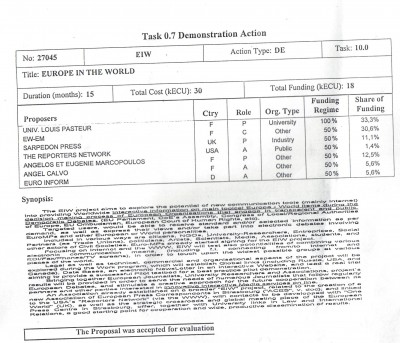
But the vital, urgent Political need for EU to search new, efficient ways to reach the People and interact with European Citizens, was really felt in Brussels and elsewhere only after the unprecedented in History 1999 and 2004 Majority Abstention in EU Elections, followed by 3 "NO" in Referenda in France, the Netherlands and Ireland, on 2005 and 2008...
In this New Political Landscape, we prepared a new, actualised and more developed version of our initial idea, in a simplified and more efficient form, thanks also to a large Experience accumulated during many years of EU/CoE/UNO Press work and Multi-lingual debates, with the New project "EuroFora" :
On 2006 we presented in Public its main lines during Questions/Replies that we raised at two Press Conferences by EU Commission President, Jose Baroso, and mainly EU Commission's vice-President, in charge of Communication policy, Margot Wallstrom, together with EU Parliament's vice-president, Alejo Vidal-Quadras, in Strasbourg, (Videos available), and we reminded it at various brief contacts with Commissioner Wallstrom in 2007 and 2008.
Meanwhile, a new Text was also presented for "EuroFora" Project mainly to certain Political and other personalities, at European, National or Regional/Local level, mainly in 2007, but also in 2008..
Now, after the unexpected 2008 Irish "NO", and before the 2009 EU Elections, which are due to be of exceptionally crucial importance for Europe's Future, the moment has obviously come to launch that project, progressively, but in real practice.
Whoever really cares for Europe and its Citizens is welcome to join, in one way or another. Only anti-European, anti-democratic, obscure or ignorant groups might oppose or attempt to "steal" and deviate the main idea.
But European Citizens, incited by enlightened political leaders, are those who will finally write the real History.
Polls
SMF Recent Topics SA
- Record Hospitalisati... (0) από Breadman
- How Many Infected by... (1) από Thunderbird
- Real Cause for Europ... (0) από Breadman
- Interesting Australi... (0) από Aurora
- Plus de mRNA Faux-&q... (0) από Aurora
- EU: Lukashenko as E... (0) από WKalina
- Why NATO in Ukraine,... (0) από Geopol
- Afghanistan's key : ... (0) από Thunderbird
- Anti-Pass Demonstrat... (0) από Aurora
- Veran - Fioraso : Mê... (1) από JohnsonE


















